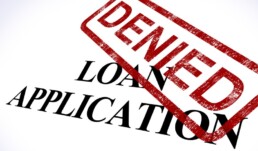What Credit Score Do You Need to Qualify for a Mortgage?
If you’re thinking about purchasing a new home or refinancing your existing mortgage, you should know that your credit score is hugely important.
Banks and mortgage lenders use your credit score(s) to evaluate your creditworthiness, which translates to a higher or lower mortgage interest rate, and even determines eligibility.
Which Credit Score Do Mortgage Lenders Use?
First and foremost, you might be wondering which credit score mortgage lenders use, seeing that there’s no sense focusing on something they won’t actually look at to determine your creditworthiness.
The short answer is FICO scores, which are the industry standard and relied upon by just about everyone.
There are three FICO scores you need to be concerned with, including one from Equifax, one from Experian, and one from TransUnion, which are the three main credit bureaus.
Know Your Credit Scores Long Before Applying for a Mortgage
Before you actually head out to get a mortgage, it’s good practice to view your credit scores long before you apply. I’m talking several months in advance because any necessary credit score changes/improvements take time.
For example, any mistakes (or legitimate issues) holding your credit score down may take months to get cleared up. And you won’t want to leave anything to chance. Yes, the credit bureaus are bureaucratic, so nothing happens all that quickly.
Also, be sure to go with a service that allows you to see all 3 credit scores, as mortgage lenders typically pull a tri-merge credit report, which includes credit scores from all three bureaus.
The bureaus each report information a little differently, so knowing just one score won’t do you (or your lender) much good.
As far as lenders are concerned, it basically allows them to triple-check your credit before making the decision to hand over a large sum of money. They use the mid-score for pricing/qualification, so it’s imperative that all 3 credit scores are in tip-top shape.
For example, if your credit scores are 650, 680, and 720, a mortgage lender would use the 680 score, which is a decent but below-average credit score.
Lower Credit Score = Higher Mortgage Rate
Put simply, a lower credit score will lead to a higher mortgage rate, and vice versa. This all has to do with risk. The lower your credit score, the higher the chance you’ll default on your mortgage, at least that’s what the statistics say.
So if your credit score is too low, you probably won’t even get approved for a mortgage. Lenders simply won’t want your business. It’s just that risky.
Lately, banks and lenders have become even more stringent, requiring higher credit scores than they have in the past.
Credit Score Below 620 Considered Subprime
As far as conventional mortgage loans go, a credit score below 620 is typically considered subprime, meaning you’ll have a difficult time qualifying for a mortgage, and if you do, you’ll receive a subprime mortgage rate.
In general, you want a credit score above 720 to avoid any negative pricing adjustments, but a 760 credit score might be the new rule if you want the best possible terms and lowest rates. If you’ve got excellent credit, you can even get a reduced mortgage rate.
In summary, your credit score is probably the one thing you have complete control of, whereas things like job, income, and assets can be at the mercy of external forces. So do your best to strive for perfection in order to get the best deal on your mortgage.
Some Useful Credit Tips for Those Shopping for a Mortgage
- Credit scores are the single most important factor in determining your mortgage rate
- Aim for a 760+ credit score to get the best pricing and to avoid scrutiny
- Credit scores aren’t everything, what’s on your credit report matters as well!
- Know the contents of your credit report and what your scores are long before your lender does
- Any mistakes or missteps can be corrected, but take time, often several months!
- The FHA now requires a minimum credit score of 500, or 580 if you put less than 10% down
- Conventional loans generally require a minimum credit score of 620
- Credit scores below 620 are considered subprime and will be priced much higher
- Lenders pull all three of your credit scores and use the median score for qualification
- Low credit scores can also disqualify you for certain loan programs and/or limit your options
- Don’t mess with your credit before or during the loan application process!
Buying a Home When Your Partner Has Bad Credit
You pay all your bills on time and you work hard to earn more — so you can save more. Your credit score reflects your savvy money management skills, and you can proudly boast that you’re a member of the 730-and-up club.
Your partner? Not so much. Whether due to past actions or financial mistakes they’re currently working to correct, your love’s credit score is not something to write home about.
What’s a committed couple ready to settle down into a place of their own to do?
Before giving up on dreams of home ownership, take a look at the following options and determine what path makes the most sense for the two of you.
Ask why your partner’s credit score is low
Before trying to beg and plead with a lender to just give you the loan, ask why your partner’s credit score is less than stellar. If in the end you can chalk a bad credit score up to a mountain of consumer debt, you both might need to take a step back.
Buying a home isn’t a requirement — it’s an important decision, but it’s a big one — and trying to force the situation while one of you faces dire financial straits is a recipe for monetary disaster.
Step one: develop a debt repayment plan. Step two: look into home ownership later, when you each carry smaller liabilities.
If your partner has “bad” credit due to long-past transgressions, you each may benefit by taking action to improve their score before applying for a home loan. Start with these tips to boost a credit score (and score a better interest rate on that mortgage):
- Check credit reports, look for mistakes, and correct errors if necessary
- Make all future payments on time and in full
- Keep your credit utilization ratio low (which means don’t run up a balance of $499 on a card with a $500 credit limit, even if you pay off that balance in full every month!)
- Leave old accounts open, but don’t use them
Make the mortgage your own
Ready to buy a house now? It may make more sense to apply for a loan on your own instead of going in jointly with your partner.
Keep in mind that lenders look at your entire financial picture to determine whether you qualify. That means your own income, assets, and credit-worthiness need to meet the lender’s requirements without any help from other sources.
Before running down this road, ensure the monthly payments and other costs associated with home ownership are ones you can shoulder with your income alone.
While no one wants to think about worst-case scenarios, it’s your name on the dotted line — and you’re the one responsible for paying the mortgage if the two of you ever split up.
Plead your case
Although mortgage lenders may seem like faceless entities incapable of deviating from their set processes, there is room for you to explain your situation and provide all the facts.
If you can show your partner’s bad credit is due to factors that will not impact your reasonable ability to repay the home loan, the lender may approve a joint application despite a low score on one end.
Ask if you can write a letter of explanation for a low credit score. If the lender says it will consider your explanation, provide as much documentation to back up your reasons as possible. Consider including explanations and documents to show how, together, you and your love can reasonably make your monthly payments on your potential loan.
Consider a co-signer
If none of the above solutions works for your situation, you can consider asking someone to co-sign the home loan with you. Another person with a good credit score, sufficient income, and low debt-to-income ratio can help you qualify for the mortgage you want.
But you shouldn’t consider this option lightly. That other person will be financially responsible for the loan if you default.
To put it simply, co-signing can come with a lot of baggage. If co-signing makes sense for you, it’s an option — though you might want to think about other options first.
Love is blind, but mortgage lenders may not be so forgiving (or, well, blind to the realities of your financial situation). That doesn’t mean buying a home is out of the question, but do your research first.
If you can find a workable solution, take action and make your home-owning dreams a reality.
And if you both need to take some time to repair that bad credit score? Do that, and rest easier knowing your financial ducks will be in a row before you take on a mortgage.


